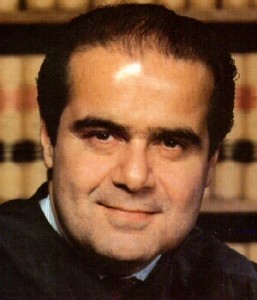Remembering Antonin Scalia
 [The following is a guest post from Daniel Suhr ’08, a prior guest alumni contributor to the Blog.]
[The following is a guest post from Daniel Suhr ’08, a prior guest alumni contributor to the Blog.]
Perhaps it is because I’ve been reading lots of Churchill lately, but in all events I am firmly convinced that there is concrete, substantive meaning to the label, “a great man.” That said, Antonin Scalia was a great man.
I remember that in high school, my father pulled me from class one afternoon to see Justice Scalia speak at Marquette’s Weasler Auditorium. I have an especially distinct recollection of a story the Justice told when asked about the difference between his policy views and his judicial philosophy. He said the morning after the release of the opinion in Texas v. Johnson, the case upholding a First Amendment right to flag burning, his wife hummed a particularly patriotic tune while making him breakfast. I subsequently saw Justice Scalia speak perhaps ten times — at the grand opening of Eckstein Hall, at the Pfister Hotel, at the Union League of Philadelphia, at a private dinner at the Court, and in several ballrooms of the Mayflower Hotel. In the last venue was my latest, and now final, opportunity to see him — he gave remarks on the 800th anniversary of Magna Carta (he insisted on leaving off the definitive article). His remarks were like his opinions: witty and wise, intelligent and insightful, and usually with a sharp elbow passed off as entirely innocent.
Others will recount at greater length the evidence for this proposition: that he was the most consequential justice of our lifetimes. Certainly the conservative legal movement would not exist as it does today without him, nor the Federalist Society as the embodiment of that movement. Ultimately I ascribe three key principles to him: textualism, the rule of law, and the sacredness of the Constitution itself.
